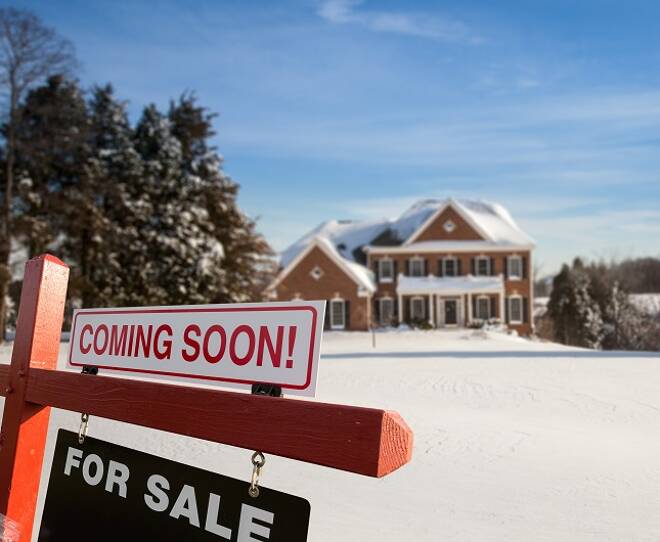Advertisement
Advertisement
US Mortgage Rates Slide for a Second Consecutive Week
By:
A fall in US mortgage rates failed to support a pickup in demand, with economic uncertainty and rates above 5% testing buyer demand.
In the week ending May 26, mortgage rates fell for the third time in twelve weeks.
30-year fixed rates slid by 15 basis points to 5.10%. 30-year fixed rates fell by 5 basis points in the week prior.
Year-on-year, 30-year fixed rates were up by 215 basis points.
30-year fixed rates were up by 16 basis points since November 2018’s previous peak of 4.94%.
Economic Data from the Week
In the first half of the week, prelim private sector PMIs for May and core durable goods orders for April were in focus.
The stats disappointed, the services PMI declining from 55.6 to 53.5.
Core durable goods orders also failed to impress, rising by just 0.3% versus a forecasted 0.6% increase.
With market jitters over the economy lingering, the numbers fueled concerns over the economic outlook.
On the monetary policy front, the FOMC meeting minutes failed to drive mortgage rates northwards.
The minutes were hawkish, showing member willingness to deliver multiple 50 basis point rate hikes. Aligned with previous Fed Chair Powell commentary, members were also willing to move beyond neutral to curb inflation.
While hawkish, the minutes did reveal a willingness to take the foot of the gas in the months ahead.
Freddie Mac Rates
The weekly average rates for new mortgages, as of May 26, 2022, were quoted by Freddie Mac to be:
- 30-year fixed rates slid by 15 basis points to 5.10%. This time last year, rates stood at 2.95%. The average fee remained unchanged at 0.9 points.
- 15-year fixed rates declined by 12 basis points to 4.31% in the week. Rates were up by 204 basis points from 2.27% a year ago. The average fee fell from 0.9 points to 0.8 points.
- 5-year fixed rates increased by 12 basis points to 4.20%. Rates were up by 161 basis points from 2.59% a year ago. The average fee rose from 0.2 points to 0.3 points.
According to Freddie Mac,
- Mortgage rates fell for a second consecutive week due to economic headwinds.
- The housing market was under pressure, however, despite the fall in mortgage rates.
- Other segments of the economy, including consumer spending on durable goods, also saw weaker conditions.
Mortgage Bankers’ Association Rates
For the week ending May 20, 2022, the rates were:
- Average interest rates for 30-year fixed with conforming loan balances decreased from 5.49% to 5.46%. Points fell from 0.74 to 0.60 (incl. origination fee) for 80% LTV loans.
- Average 30-year fixed mortgage rates backed by FHA increased from 5.32% to 5.36%. Points rose from 0.71 to 0.82 (incl. origination fee) for 80% LTV loans.
- Average 30-year rates for jumbo loan balances slipped from 5.03% to 5.02%. Points declined from 0.61 to 0.41 (incl. origination fee) for 80% LTV loans.
Weekly figures released by the Mortgage Bankers Association showed that the Market Composite Index, a measure of mortgage loan application volume, decreased by 1.2%. The Index slid by 11% in the previous week.
The Refinance Index declined by 4% and was 75% lower than the same week a year ago. In the week prior the index slid by 10%.
The refinance share of mortgage activity decreased from 33.0% to 32.3%. In the previous week, the share increased from 32.4% to 33.0%.
According to the MBA,
- The 30-year fixed rate fell for a second consecutive week but remained well above what borrowers paid over the last two years.
- Most refinance borrowers remained on the sidelines, with refinance applications falling in nine of the last ten weeks.
- Higher mortgage rates are also affecting the purchasing market, with the purchase index at its lowest level since spring 2020.
For the week ahead
It’s another relatively busy first half of the week ahead.
On Tuesday, US consumer confidence figures will be in focus ahead of ADP nonfarm employment change and ISM manufacturing PMI numbers.
The stats will influence demand for Treasuries. Weak numbers could send mortgage rates on the slide for a third consecutive week.
From China, private sector PMIs will also influence, along with news updates on COVID-19 lockdown measures.
About the Author
Bob Masonauthor
With over 28 years of experience in the financial industry, Bob has worked with various global rating agencies and multinational banks. Currently he is covering currencies, commodities, alternative asset classes and global equities, focusing mostly on European and Asian markets.
Advertisement
